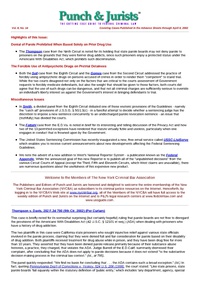Petitioner filed a petition for a writ of habeas corpus, challenging his conviction for kidnapping and attempted sodomy. The United States District Court for the District of Oregon dismissed the petition, finding that petitioner's ineffective assistance of appellate counsel was procedurally defaulted because of lack of exhaustion. Petitioner appealed.
…
This case is noted for its somewhat surprising (but potentially very useful) ruling that parole boards are not free to disregard the provisions of the Americans With Disabilities Act (42 U.S.C. § 12101 et seq.) (ADA) when dealing with prisoners who have a history of drug addiction.
The two …
Here the Court vacated a district court order permitting the Government to forcibly medicate a pretrial detainee with antipsychotic drugs on the grounds that it failed to consider and evaluate the proper standards involved in determining that order.
In this case, the Second Circuit vacated an order issued …
Here the Court held that a conviction does not become "final" until the 90-day period for seeking certiorari from the Supreme Court has expired, even though the petitioner never actually petitioned for review by the Supreme Court.
In this case, the petitioner, a federal prisoner, appealed the judgment …
Here the Court held that Apprendi is not applicable retroactively to cases on collateral review, but it also held that the dismissal of his habeas petition as untimely was error because the court.
In this case, the petitioner, a federal prisoner, appealed the judgment of the United States …
Here the Court held that, despite the lack of any reference in USSG § 5C1.2 to offenses under 21 USC § 860, the district court erred in concluding that the defendant did not meet the criteria for a safety-valve departure under USSG § 2D1.1(b)(6).
In this case the …
This case is moted for its discussion of the Privacy Act, and particularly how two of the 13 exceptions to that Act (the "consent" and "routine use" exceptions) have rendered that statute virtually futile and useless, at least in certain cases.
In theory, the Privacy Act (5 U.S.C. …
This decision contains an exhaustive analysis of the proper interpretation of one of those absurdly technical, difficult to interpret provisions of the Guidelines that rarely comes into play; and thus is generally ignored. The provision at issue, U.S.S.G. § 5G1.3, has created a debate among the Circuits; and, as …
Here the Court vacated a robbery conviction under the Hobbs Act and remanded back to the district court for further determinations as to whether the defendant's actions had some cumulative effect on interstate commerce.
Here the Court held that section 236(c) of the Immigration and Nationality Act (18 U.S.C. § 1226(c)), which required the mandatory detention of criminal aliens pending administrative removal proceedings, is unconstitutional as violative of both substantive and procedural due process, as applied to lawful permanent resident aliens.
The …
Here, a divided panel held, as a matter of first impression, that the Government could, subject to certain limitations, forcibly administer antipsychotic drugs to a pretrial detainee for the purpose of rendering him competent to stand trial.
The forced use of antipsychotic drugs to restore a defendant to …
